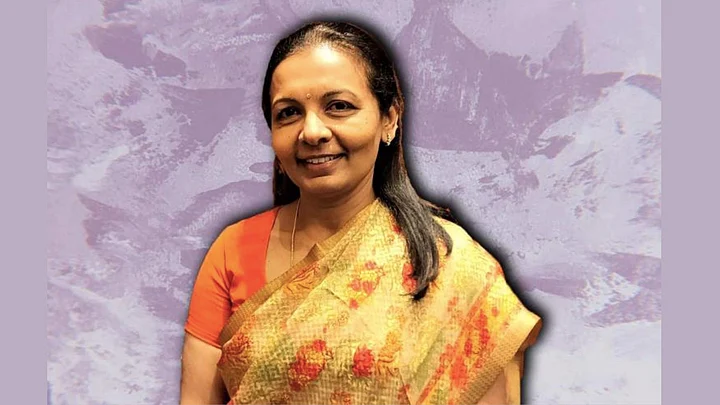A nuclear scientist, who has 23 years of work experience across Fortune 500 companies, multiple patents to her credit, and numerous research papers – but Dr Valli Arunachalam was always mistaken for a man at academic conferences, at the beginning of her career.
"I would be referred to as Dr Arunachalam in all emails, and other correspondences. So when I arrive at a conference and I say that I am Dr Arunachalam, I get a look of shock because they were expecting a man. There were so few women at that time, that it was shocking for anyone to believe that a woman can be qualified enough to peer review papers. But at the same time, people also do not ever forget you after that," Arunachalam, who is currently living in the US, tells The Quint.
Arunachalam now witnesses the same bias in Indian boardrooms. Since 2017, she has been fighting a battle to find space in the all-male board of Ambadi Investments Ltd (AIL), the holding company of Chennai-based $5.7 billion Murugappa Group, of which her late father MV Murugappan was the executive chairperson.
"There is an inherent bias. Families simply do not want women in their boardrooms. Patriarchy is holding women back – and this mindset that women belong at home is only feeding into it."
Arunachalam's Battle & Inherent Bias In Boardrooms
Women's representation of board seats increased by 9.4 percent from 2014 to 17.1 percent in India, according to Deloitte's Women in the Boardroom report, released in 2022.
Women comprise only 3.6 percent of the board chairs, down by 0.9 percent since 2018. The global average is 19.7 percent – which has reportedly grown 2.8 percent since 2018.
At the current pace, the report predicts, the world could expect a near parity in 2045 – over two decades from now.
"When I applied for the board seat, in my family's own business after my father's passing, it was denied to me. This was a seat that my father held for decades – I am not saying that the board seat is to be inherited, but just to give you context. I came with decades-worth experience in Fortune 500 companies, a PhD in nuclear science. But compare this to a 23-year-old male cousin, who was just out of college, to whom a seat was simply passed on, no questions asked."
"Why is the bar so low for sons? Why is it insurmountably high for the daughters? That is playing into this discrimination," Arunachalam adds.
In India, the Companies Act, 2013, which mandated having one woman member on the Board of the top 1,000 publicly listed companies, is credited for the marginal increase in the numbers.
While some companies are listed in the Murugappa Group, Ambadi Investments Ltd, where Arunachalam is claiming a seat – isn't.
Arunachalam's petition for a board seat before the National Company Law Tribunal in Chennai has been ongoing for many years, but she refuses to back down. The point of dispute is either a board seat for her or just value for her family’s 8.23% stake in the group – both of which are allegedly being denied to her after her father passed away.
"If you have one woman director, it cannot make that big of a difference. But the more women you have at the top, the more you can drive a change."
Having Less Women At Top Is Detrimental to Business
Women are better risk managers, says Arunachalam. As a scientist, she adds that she relies on data – and data does not lie.
"There is so much data out there that has been put forth by world renowned consulting companies, the McKinsey's, the Deloitte's, and reputed organisations like the United Nations that point to the fact that women are much better at managing risk. Like Chirstine Lagarde (former IMF Chief) said, if Lehman Brothers were Lehman Sisters, I believe the world would have been a different place."
Secondly, women bring diversity of thought to the table.
"What do businesses do? They service their customers, right? What percentage of your customers are women? 50 percent for most businesses. It just makes sense that boards have diversity that represents their customer base, so that they can serve their customers, because if it were not for your customers, you would not be as successful as you are. So if boardrooms can recognise that and say we have so much untapped potential, they can become more successful."
The most diverse task forces are the ones that reached a solution fastest – so having an inclusive board is almost a no-brainer for organisations.
An Ideal Workplace Should Be 50-50
Imagine a 50-50 board, says Arunachalam, adding that it may help in also retaining women in the workplace.
"Women deal with far more complex challenges at workplaces. Having more women at the top would help collectively drive change internally as well. Women leaders understand the issues women down the ladder face, and are in a better position to fix the leaky pipeline and get more women in leadership positions."
"I regret that women have to work so much harder than men. They have to prove themselves multiple times over to get recognition. I am just fighting for a level-playing field."
"Let your passion drive you. There will be hurdles along the way, and you will fail, but women should not be discouraged. Question the system and keep on going," she adds.
